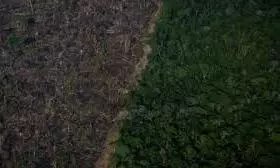
"Sixth great extinction": Dr. Jane Goodall urges action to protect planet
text_fieldsRenowned primatologist and conservationist Dr. Jane Goodall has issued a stark warning about the escalating global biodiversity crisis, referring to it as the “sixth great extinction.”
Speaking during her recent environmental advocacy tour in Europe, the 90-year-old environmentalist called for immediate action to combat deforestation, restore ecosystems, and reduce dependency on fossil fuels.
In an interview with the BBC, Dr. Goodall highlighted the devastating impact of habitat destruction, particularly deforestation, on biodiversity. Citing efforts in Uganda, she mentioned that her foundation, in collaboration with the tech company Ecosia, has planted nearly two million trees over the past five years. This initiative aims to revive habitats for roughly 5,000 chimpanzees and contribute to mitigating climate change by enhancing carbon sequestration.
Dr. Goodall’s warning coincided with the COP29 climate summit in Baku, Azerbaijan, where global leaders convened to discuss strategies for combating climate change. She linked the destruction of forests to increasingly erratic weather patterns that disrupt ecosystems and threaten wildlife.
Recalling her research in Tanzania more than six decades ago, Dr. Goodall reflected on how predictable rainy seasons have given way to irregular rainfall, creating ecological instability.
“Protecting forests and enforcing stricter environmental regulations for harmful industries are critical steps to address these challenges,” Dr. Goodall emphasized. She also warned about the harmful effects of industrial farming, which depletes soil health and accelerates the loss of biodiversity.
Dr. Goodall’s groundbreaking studies on chimpanzees in Tanzania redefined primatology, revealing their use of tools, complex social interactions, and territorial behavior. Reflecting on her experiences, she recounted a memorable encounter with a chimpanzee named David Greybeard, who demonstrated trust by gently squeezing her fingers. This pivotal moment, she said, reinforced her dedication to fostering harmony between humans and wildlife.
Despite early doubts about her unconventional research methods, Dr. Goodall has become a global voice for conservation. She urged governments to adopt stricter environmental laws and called on individuals to contribute to a more sustainable future.
“Our survival as a species depends on the choices we make now,” she warned, underscoring the urgency of collective action to safeguard the planet's ecosystems and biodiversity.























